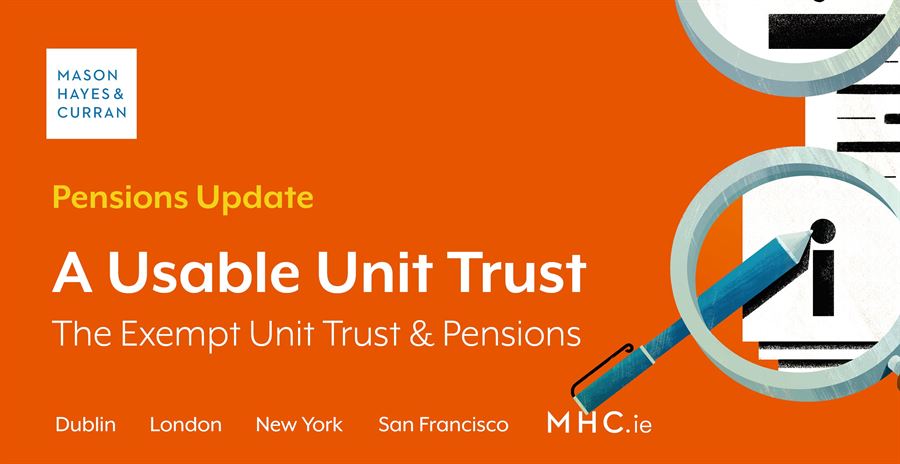A Usable Unit Trust: The Exempt Unit Trust & Pensions

The exempt unit trust has occupied its own space in the Irish range of investment vehicles since its inception in the 1960s. It was established for use by both pensions and charities and benefits from an exemption from capital gains tax, income tax, deposit interest retention tax and dividend withholding tax. The exempt unit trust has proven to be particularly popular with providers of single member pension schemes as an investment vehicle for regulated and unregulated investments.
The exempt unit trust in Irish law
The Exempt Unit Trust (EUT) is recognised under tax law and it does not require authorisation by the Central Bank of Ireland (CBI), except in limited circumstances where investor funds are pooled. EUTs are closed-ended and are not generally open to the public.
As the name suggests, EUTs are currently exempt from capital gains tax (CGT), income tax, deposit interest retention tax and dividend withholding tax. While any entity can establish an EUT, it can only be utilised by CGT exempt entities, specifically pensions and charities. Other types of unit trust are governed by the UCITS Regulations and the Unit Trust Act 1990, but do not benefit from the same range of tax exemptions. As EUTs are not authorised by the CBI they do not undergo a formal product approval process.
 Pensions and the exempt unit trust
Pensions and the exempt unit trust
As pension schemes benefit from a CGT and income tax exemption they are eligible to become unit holders in an EUT. Many providers of single member pensions in the Irish market have also established EUTs. While EUTs can be used to hold regulated investments, such as insurance policies or financial instruments regulated by the MiFID Regulations, they are typically utilised for unregulated investments such as real property or loan notes issued by private companies.
Pension property
Typically a separate EUT sub-trust will be set up to hold each property on behalf of each single member scheme. Each sub-trust will, in turn, have its own bank account to receive rental income and to make mortgage repayments where gearing has been obtained to purchase the property. An important aspect of the EUT is that it allows for any gearing to be ring-fenced from the other assets of the unit holding pension, this means that the mortgagee’s recourse is limited only to the property. A significant further benefit of the EUT is that upon retirement the units in the EUT can be transferred in specie to an Approved Retirement Fund (ARF). If the property was held directly by the scheme and without an EUT, the property would need to be formally conveyed from the pension scheme to the ARF on retirement.
Private company loan notes
As well as investments in property, EUTs are often used by providers of single member pensions to hold other unregulated investments such as non-transferable private company loan notes. We explore these transactions in more detail here; this type of pension lending is seen as an important part of the private debt market, especially during recessionary periods when the availability of bank lending for start-ups has dried up. Such loan notes are a popular choice for single member pensions, given their greater level of expected return over regulated markets.
Borrowing by exempt unit trusts
While borrowing to finance the purchase of a property by an EUT sub-trust is possible, there is an extensive set of Revenue rules which limit the flexibility of such borrowing. For instance, rental income from a property cannot be assigned, loan terms cannot exceed 15 years and interest only loans are prohibited.
Comment
Pension providers will continue to find EUTs useful for as long as single member pensions are permitted to hold unregulated investments.
However, the much anticipated implementing regulations for the IORP II Directive could make investment in property much more difficult, if the anticipated derogation for single member schemes is not included. If that occurs scheme assets will have to be “predominantly invested” in regulated markets. “Predominantly” is generally thought to mean 51% or more of a scheme’s assets.
For further information regarding exempt unit trusts and single member pension investments, contact a member of our Pensions team.
The content of this article is provided for information purposes only and does not constitute legal or other advice.
Share this:




